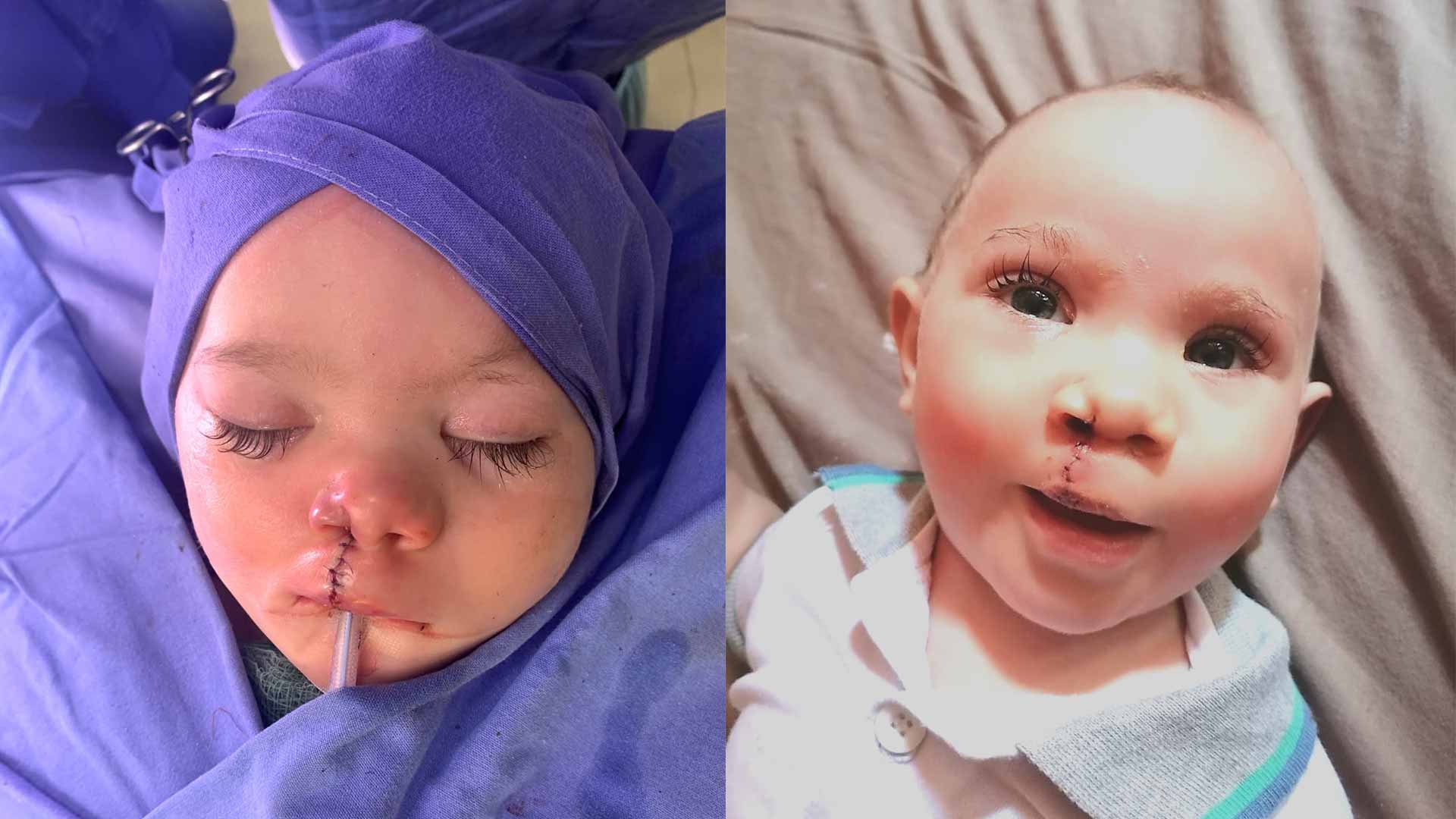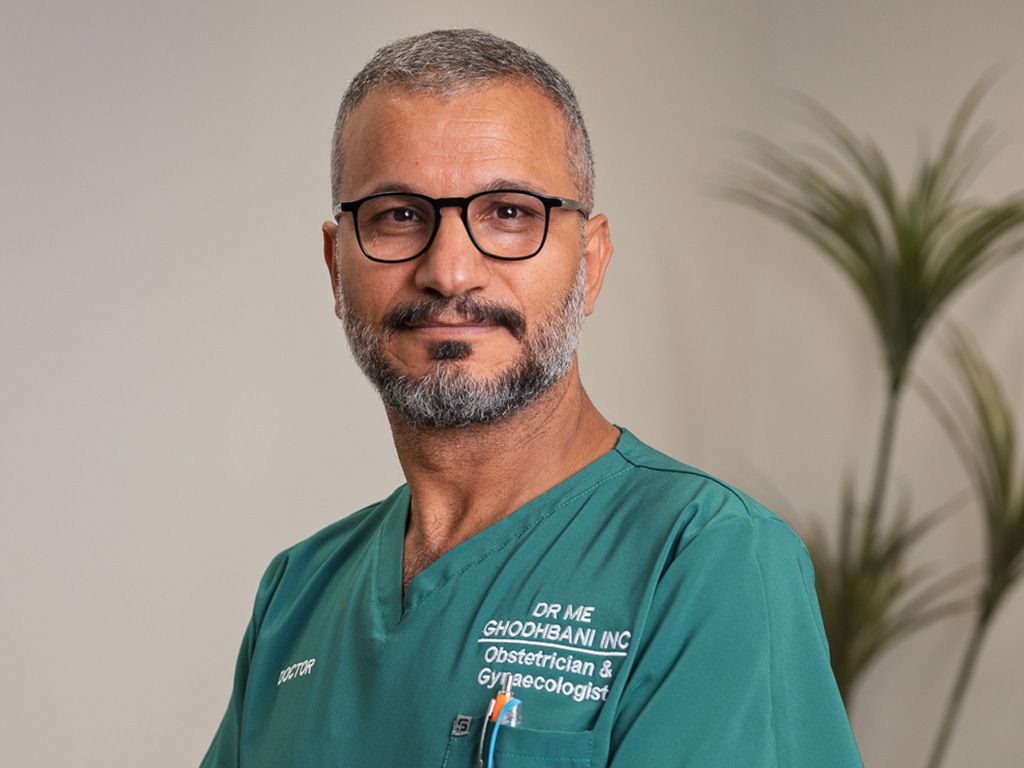East Rand baby boy benefits from cleft lip repair procedure
October 28, 2020
Picture on the left: Born with a cleft lip and palate, 11-month old Hanru van der Merwe has undergone the first of a series of procedures to correct the condition. Hanru is pictured here shortly after having had the first procedure – to correct his cleft lip – at Netcare Sunninghill Hospital. Picture on the right: Hanru’s father, Ruan van der Merwe, says that he and his wife, Angelique, are absolutely delighted that their firstborn, Hanru, who is pictured here recovering at home a few days after surgery, was able to have surgery to repair his cleft lip.
Netcare Foundation enables cleft and palate procedures that will transform Hanru’s life
Born with a cleft lip and palate, 11-month old Hanru van der Merwe of Brakpan on Johannesburg’s East Rand, has undergone the first of a series of procedures he will require to correct the condition, thanks to the goodwill of a number of individuals and the Netcare Foundation.
Hanru’s father, Ruan van der Merwe, says that he and his wife, Angelique, are absolutely delighted that their firstborn, Hanru, was recently able to have the procedure which will not only transform the little boy’s face once all the procedures have been completed but will substantially improve his quality of life.
“He is such a precious and vibrant little boy and his cleft lip and palate not only impacted his feeding and speech but also resulted in healthcare issues such as recurrent ear infections which could potentially result in hearing loss. We are most grateful to the Netcare Foundation, his surgeon, Professor Tim Christofides, Netcare Sunninghill Hospital and all of those who have assisted to make it possible for Hanru to have this life-changing procedure,” he says.
Van der Merwe notes that he and his wife are currently unemployed and were so desperate to find urgent help for their son, who has a deep and disfiguring cleft lip and palate, that they started a Facebook group called “Help for Hanru”.
“Hanru was on a waiting list for a procedure. Alet Cloete, the reception manager at Netcare Sunninghill Hospital, however, saw Hanru’s Facebook page and brought his plight to the attention of the hospital general manager, Pieter Louw. Pieter encouraged and assisted us to apply to the Netcare Foundation for funding for Hanru’s procedure, and we are thankful that he did, because Hanru has now had the benefit of the first of the necessary procedures,” adds Van der Merwe.
The Netcare Foundation, which facilitates access to sustainable corporate social health care initiatives to assist economically disadvantaged patients around South Africa, agreed to help and a first appointment was set up on 2 October with leading South African cleft lip and palate repair surgeon, Professor Tim Christofides, who practises at the hospital. Professor Christofides and his team then completed the surgery to correct Hanru’s lip and nose on 16 October. Professor Christofides says that the operation went very well and Hanru is currently recovering at home.
“Unfortunately a cleft lip and palate such as Hanru’s can have a negative impact on a child’s development. It is therefore best to operate while they are still relatively young and it should certainly not be left so long as to affect a child’s confidence. In addition, a cleft lip and palate can greatly impede speech and even the feeding of a baby because those with a cleft lip and palate often struggle to swallow milk,” he says.
According to Professor Christofides, a cleft lip correction procedure should ideally be done between three and six months of age. The cleft palate surgery should be done around nine months of age, particularly to prevent the condition from having a negative impact on speech development. He says cleft lip and palate invariably requires treatment by a multi-disciplinary team, including paediatricians, plastic and reconstructive surgeons, ENT surgeons, oral surgeons, social workers and speech therapists.
“Treatment of cleft lip and palate is a process. The procedure to repair Hanru’s cleft is the first in a series that will be necessary to completely repair both his lip and palate. It is not just the surgery that is important, but also the support provided after the procedure or procedures. Speech therapy should help the child to learn to communicate properly and build their self-confidence.
Professor Christofides says clefts can be the result of a genetic disposition, but much about their causes is still not well understood. It is known that they occur when the tissues, muscles and sometimes even bones do not develop properly during pregnancy.
“Early surgical intervention is important, as it can prevent speech patterns being negatively affected. As these children look different they are often discriminated against with consequences for their self-esteem.”
“A great many South African parents do not realise that the quality of life of children born with cleft lip and palate can be drastically improved as help is available, and that there is always a way to get assistance for your child,” notes Professor Christofides.
“The Netcare Foundation’s offer to assist is a Godsend,” adds Van der Merwe. "I was worried that life would be hard for my little boy. Hanru is special but because of the way he looked others never knew that. Now our special little boy will be given the opportunity to lead a normal life just like other children.”
Mande Toubkin, who heads the corporate social investment (CSI) department in Netcare and is also a director of the Netcare Foundation, says that corporate social responsibility is deeply entrenched within Netcare.
“Throughout our Netcare operations, doctors and staff members have a deep commitment to assist in improving the quality of life for less privileged individuals and communities through many different outreach initiatives,” she says.
She explains that some of the specialised surgical programmes that are supported by the Netcare Foundation on an ongoing basis include craniofacial surgery to correct severe facial anomalies, surgical correction of cleft lip and palate mainly in children, and cataract surgery to restore the sight mainly of senior citizens.
“Netcare Foundation is pleased to be able to assist little Hanru and his family. What is a routine operation for Dr Christofides is life changing for the many children whose lives are touched by his skilled and caring hands,” concludes Toubkin.













